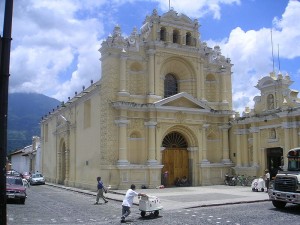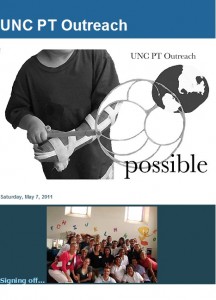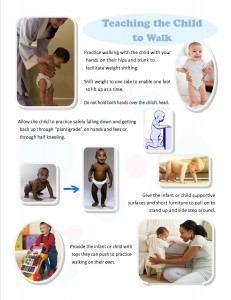I chose to incorporate my Capstone Project with my participation in the UNC PT Outreach Service Learning Trip to Antigua, Guatemala. The UNC PT Outreach Service Learning Trip was founded in 2010 on the American Physical Therapy Association Vision 2020 principles of providing evidence-based services to improve societal quality of life, culturally sensitive care, and enhancing availability of comprehensive and accessible healthcare1. This year, as it has been in the two previous years, a team of entry level Doctorate of Physical Therapy students, faculty members, and alumni will travel to Guatemala in the spring to engage in a weeklong mutual learning exchange with the Guatemalan physical therapists. Pediatric positioning and handling has been an ongoing area of concern and area of interest for continuing education and training for the Las Obras Sociales del Hermano Pedro physical therapy staff.

Las Obras Sociales del Hermano Pedro (Las Obras) is a volunteer-driven multiservice facility in Antigua, Guatemala that provides healthcare to over 300 children and adults who are mentally or physically challenged or chronically ill. The nursery and children’s ward serves young infants and children ranging in age from birth through early teenage years. Some children may remain a patient at the hospital for days, years, or their lifetime. Many of these children experience nourishment issues, medical disability, are of lower than average size and maturity, are awaiting surgical procedures, and have subsequent developmental delay and decreased functional movement skills. The young high-risk children (birth to 5 years of age) are in need of developmental physical therapy interventions to promote symmetry, muscle balance and gross motor movement, using postural support and facilitation techniques.
It has been my intent to develop a series of culturally appropriate posters depicting strategies for environmental modifications in the nursery, feeding the infant or child, teaching the infant or child gross motor skills to facilitate walking, and positioning the infant or child to address the needs of the pediatric population at Las Obras. In preparation for my Capstone Project, I compiled an evidence table to better understand the best physical therapy treatment techniques to promote developmental progress and motor skill acquisition in young children with developmental delays. The conclusions drawn from the evidence suggest the importance of age-matched physical therapy approaches2. The literature supported the use of Newborn Individualized Developmental Care and Assessment Program (NIDCAP) principles and the use of Neurodevelopmental Treatment (NDT) based intervention for young children ages birth to five years or older2,3,4,5,6,7,8,9,10,11,12,13. The principles of these two approaches, NIDCAP and NDT, formed the theoretical basis for the educational posters and hands-on demonstration based learning experience. In preparation for the UNC PT Outreach Service Learning Trip, I conducted a cultural analysis, needs assessment, and educational inservice program plan for the particular hospital and region of Guatemala throughout the health and wellness coursework. To further prepare for my Capstone Project and participation in the UNC PT Outreach Service Learning Trip, I sought advanced training through an intensive weeklong neurodevelopmental treatment course to improve my own handling and facilitation skills.
With the assistance and guidance of my Capstone Project committee members, I have developed a series of four culturally appropriate posters for use by the Las Obras Sociales del Hermano Pedro staff, Capstone English and Capstone Spanish. The two primary posters target the areas of concern that have been ongoing areas of focus in previous UNC PT Outreach Service Learning trips: feeding the infant or child and teaching the child to walk. The other set of posters address strategies for environmental modifications in the nursery and positioning the infant or child. To prepare them for presentation, my capstone posters have been reviewed by a consultant from a print design production company. The Pediatric Positioning and Handling posters are presented in English and in Spanish and are appropriate for many audiences, not only the Guatemalan community. An introduction to the material, demonstration based presentation, and practice session will take place in the nursery of Las Obras during the week of April 24-May 2nd. An evaluation form, presented in both Spanish and English, will be used to assess the quality, organization, relevance, and usefulness of the posters and hands on demonstration based presentation and practice session. Information collected from the evaluation forms will be shared after the conclusion of the service learning trip and return home.

If you are interested in following the details of the UNC PT Outreach Service Learning trip to Antigua, Guatemala I encourage you to visit http://uncptoutreach.blogspot.com where updates will be posted daily during our trip.
I would like to extend a very big thank you to Derrick O’Neal for graciously lending his time and talents to provide me with the Spanish translations for this project. Gracious thanks also belong to my Capstone advisor Katie Ollendick and committee members Dawn Phillips and Marie Reilly. This project has already been an immensely rewarding experience and I thank each of you for all that you contributed to its success.
References:
1 American Physical Therapy Association. Vision 2020. http://www.apta.org/vision2020/. Updated:October 4, 2011. Accessed: April 9, 2012.
2 Blauw-Hospers CH and Hadders-Algra M. A Systematic Review of the Effects of Early Intervention on Motor Development. Developmental Medicine and Child Neurology. June 2005. 47(6):421-432.
3 Cameron E, Maehle V and Reid J. The Effects of an Early Physical Therapy Intervention for Very Preterm, Very Low Birth Weight Infants: A Randomized Controlled Clinical Trial. Journal of Pediatric Physical Therapy. 2005. 17:107-119.
4 Blauw-Hospers CH and Hadders-Algra M. A Systematic Review of the Effects of Early Intervention on Motor Development. Developmental Medicine and Child Neurology. June 2005. 47(6):421-432.
5 Resnick MB, Eyler F, Nelson RM, Eitzman DV and Bucciarelli RL. Developmental Intervention for Low Birth Weight Infants: Improved Early Developmental Outcome. Journal of Pediatrics. July 1987. 80(1):68-74.
6 Arndt SW, Chandler LS, Sweeney JK, Sharkey MA and McElroy JJ. Effects of a Neurodevelopmental Treatment-Based Trunk Protocol for Infants with Posture and Movement Dysfunction. Journal of Pediatric Physical Therapy. Spring 2008. 20(1):11-22.
7 Mahoney G, Robinson C and Fewell R. The Effects of Early Motor Intervention on Children with Down Syndrome or Cerebral Palsy: A Field-Based Study. Journal of Developmental and Behavioral Pediatrics. 2001. 22: 153-162.
8 Mayo N. The Effect of Physical Therapy for Children with Motor Delay and Cerebral Palsy. American Journal of Physical Medicine and Rehabilitation. 1991. 70: 258-267.
9 Jenkins JR, Sells CJ, Brady P, Down J, Moore B, Carman R and Holm R. Effects of Developmental Therapy on Motor-Impaired Children. Physical and Occupational Therapy in Pediatrics. December 1982. 2(4):19-28.
10 Als H, Lawhon G, Brown E, Gibes R, Duffy F, McAnulty G, Blickman J. Individualized Behavioral and Environmental Care for the Very Low Birth Weight Preterm Infant at High Risk for Bronchopulmonary Dysplasia: Neonatal Intensive Care Unit and Developmental Outcome. Pediatrics. 1986; 78: 1123-1132.
11 Als H, Lawhon G, Duffy F, McAnulty G, Gibes-Grossman R, Bickman J. Individualized Developmental Care for the Very Low Birth Weight Preterm Infant: Medical and Neurofunctional Effects. Journal of the American Medical Association. 1994; 272: 853-858.
12 Als H, Gilkerson L, Duffy F, McAnulty G, Buehler D, Vandenberg K, Sweet N, Sell E, Parad R, Ringer S, Butler S, Blickman J, Jones K. A three-center, randomized, controlled trial of individualized developmental care for very low birth weight preterm infants: medical, neurodevelopmental, parenting and caregiving effects. Developmental and Behavioral Pediatrics. December, 2003; 24 (6): 399-408.
13 Spittle A, Orton J, Doyle LW, Boyd R. Early Developmental Intervention Programs Post Hospital Discharge to Prevent Motor and Cognitive Impairments in Preterm Infants. The Cochrane Collaboration. 2009.



4 Responses to “Pediatric Positioning and Handling: A Service Learning Project for Las Obras”
leighmcl
Susan, Katie and Amanda, thank you for your positive feedback and words of encouragement! I am really looking forward to engaging in a mutual learning experience with the pediatric therapists and the children they work with. From the great advice I’ve been given, I think it will be important to focus in on functional goals. I will need to tie skills such as the child spending time on their stomach to the functional goal which of increased activity in the head and neck against gravity enabling strengthening and better interaction with the environment, for example. I hope that I can convey some techniques that will help the therapist engage in active facilitation with the child so that the majority of their therapy sessions are not passive stretching and range of motion in an inactive child. I also potentially see the feeding component of this project being helpful because there are many children to be fed in a compressed schedule of time. I believe that these feeding techniques could allow for a more positive, enjoyable feeding experience that could be as time efficient or better. I appreciate your comments and will keep you posted on the outcome of my presentation with the Guatemalan community.
Amanda Reed
Great job Leigh! It looks like you have put a lot of work into this project, and I am looking forward to being in Guatemala and seeing your presentation.
Katie Ollendick
Wonderful work Leigh. I think you will find the experience in Guatemala extremely rewarding and your knowledge and handouts will be well received. Great work and I look forward to sharing the upcoming experience in Guatemala with you.
Susan Reeves
Leigh this is excellent work! Your posters are a great tool to leave behind with the Las Obras Sociales del Hermano Pedro staff. I think that your focus on developmental handling, positioning, and environmental modifications in the NICU has such a potentially good reach and impact without an investment of additional equipment and supplies. I hope that the teams in Antigua have been successful in carrying through with the techniques that you brought them. What a great project! Congratulations. Susan